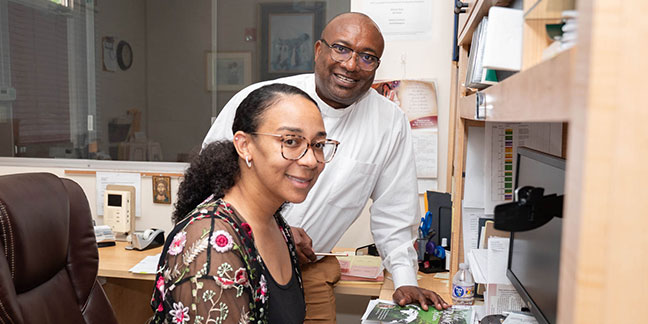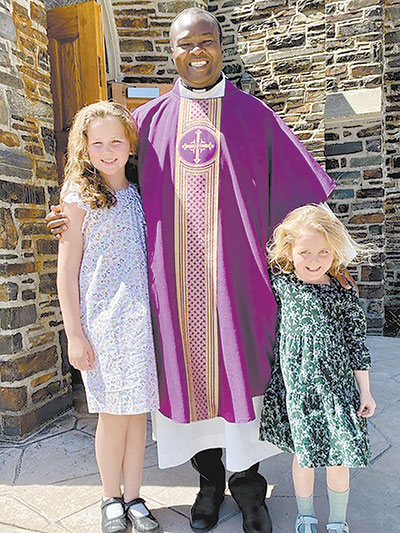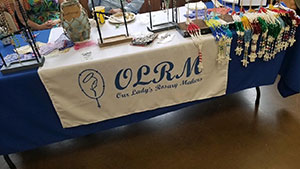'Sharing of Gifts'
 Father Basile Sede praises the commitment of Catholics he’s seen in the diocese and says “that challenges me.” He’s learned from his service as pastor of Our Lady of Consolation Parish in Charlotte. (Troy Hull | Catholic News Herald) CHARLOTTE — While the Diocese of Charlotte’s successful seminary program hosts a record 51 men preparing for the priesthood this year, the diocese is also responding to the growing pastoral needs of its half-million Catholics through a unique partnership in the West African nation of Cameroon.
Father Basile Sede praises the commitment of Catholics he’s seen in the diocese and says “that challenges me.” He’s learned from his service as pastor of Our Lady of Consolation Parish in Charlotte. (Troy Hull | Catholic News Herald) CHARLOTTE — While the Diocese of Charlotte’s successful seminary program hosts a record 51 men preparing for the priesthood this year, the diocese is also responding to the growing pastoral needs of its half-million Catholics through a unique partnership in the West African nation of Cameroon.
An ocean away, the Diocese of Buea (pronounced Boo-yaa) is also experiencing a healthy harvest of priestly vocations and is well positioned to send priests to serve in North Carolina. It’s a special relationship that brings spiritual, cultural and material benefits for both dioceses.
“Our partnership is essentially a sharing of gifts,” says Monsignor Patrick Winslow, vicar general and chancellor of the Diocese of Charlotte. “They share the wealth of their vocations to the priesthood to help us with our needs as a fast-growing diocese, and we are able to assist with some of the material needs in the Diocese of Buea.”
“Beyond the practical exchange,” Monsignor Winslow adds, “there are also the intangible benefits of the relationships, the cultural enrichment, and learning about one another’s practice of the faith. While they imprint a little bit of Africa on us, we imprint a little bit of North Carolina on them.”
The program began in 2016 and to date, eight priests from the Buea diocese have been temporarily assigned to serve across the Charlotte diocese – from the state’s biggest city of Charlotte to the quintessentially American small town of Mount Airy (home of Andy Griffith). The Cameroonian priests remain under the authority of their bishop but gain experience and cultural enrichment while serving here as parochial vicars, pastors, campus ministers and administrators. With permission of Charlotte Bishop Peter Jugis and his counterpart in Buea, some priests even seek higher education at American universities while they live and serve here.
In exchange for the priests’ service, the Charlotte diocese provides an annual stipend on behalf of each priest to the Buea diocese, an amount similar to its contribution to local priests’ retirement fund. The financial support goes a long way in Buea, funding a variety of needs.
“Having the Buea priests here is a sign of the universality of the Church,” Monsignor Winslow says. “The priests offer some unique cultural perspectives on faith which are good for our people to have. People through time have extolled the benefits of travel for experiencing different situations and circumstances. In this program, the traveler comes to our people here, and both receive the benefits of the new perspectives.”
A faithful exchange
The Cameroonian priests muse about learning to live and minister in a new country – adapting to new foods, customs, technology, and a faster pace of life. Language barriers also must be overcome. It takes time, they say, to understand the idioms and nuances of American English and a Southern dialect, and the Buea priests recognize it can be hard for some parishioners to understand their African accents.
Throughout their varied experiences, however, all say they have been impressed by the welcome they’ve received, the lessons they have learned, and the commitment to faith of the area’s Catholics.
“Catholics here in North Carolina and in the U.S. are radically fighting for their faith, and that for me is a very good thing to see,” said Father Basile Sede, pastor of Our Lady of the Consolation Parish in Charlotte. “In my current church, people show up in numbers for confession, they are there every morning for the rosary, for Mass. They are committed to their faith, and that in turn challenges me.”
Change brings growth
 St. Leo parishioners express gratitude for the work of Father Felix Nkafu, who has served as their parochial vicar since his arrival in the U.S. in 2016. “Father Felix brought a special passion for the faith,” said Father Christopher Gober, pastor, noting that all of the parishes who have received Cameroonian priests “have been blessed.” (Photo provided)The Buea bishop selects the priests he believes would be the best fit for the North Carolina ministry, and all of them come with a letter of good standing from him – required by the Catholic Church for all priests ministering in another jurisdiction.
St. Leo parishioners express gratitude for the work of Father Felix Nkafu, who has served as their parochial vicar since his arrival in the U.S. in 2016. “Father Felix brought a special passion for the faith,” said Father Christopher Gober, pastor, noting that all of the parishes who have received Cameroonian priests “have been blessed.” (Photo provided)The Buea bishop selects the priests he believes would be the best fit for the North Carolina ministry, and all of them come with a letter of good standing from him – required by the Catholic Church for all priests ministering in another jurisdiction.
Each priest is here for a limited time as defined by the bishops’ mutual agreement, typically around five years, although a few extensions have been granted to allow the priests to serve a bit longer. This year, two of the eight priests have been called back to Cameroon to allow two new Buea priests to participate in the international experience.
“Change is the sign of a living Church,” Monsignor Winslow says. “There is a bit of sadness as we say goodbye to those priests who have served, lived and grown here with us. We are blessed their vocations crossed paths with the Church here in Charlotte. And while we will miss them, we are also excited to receive the new priests who will come and share their ministries with us.”
Father Henry Tutuwan’s assignment at St. Benedict the Moor Parish in Winston-Salem and Good Shepherd Mission in King ended in July. Father Felix Nkafu’s assignment at St. Leo Parish in Winston-Salem ends on Aug. 28.
Father Felix has served as parochial vicar at St. Leo since his 2016 arrival in the U.S. Parishioners express gratitude for his commitment to them, particularly throughout the early months of the pandemic, and for his joyful presence in the parish and in the school. During his stay, he also earned a master’s degree.
“The people of St. Leo are like family,” Father Felix says. “They are wonderful, very prayerful people. They love their faith. They try to live their faith, and they encourage others to live the faith, while also offering their support.”
Father Christopher Gober, pastor of St. Leo and vocations director for the Charlotte diocese, said the Buea diocese’s gift of priests is also a sacrifice, given the overwhelming need for priests in Africa.
Catholicism is growing faster in Africa than in any region in the world. In 1910, there were approximately 1 million Catholics in Africa. Today, the continent is home to more than 170 million Catholics or 16 percent of the faith, according to the Pew Research Center.
“We have been truly blessed to have Father Felix at St. Leo, as have all of the parishes where the Buea priests are serving,” Father Gober says. “Father Felix brought a special passion for the faith.”
Teaching the teachers
The Buea priests, in turn, say they have grown spiritually and learned more than they imagined during their service in North Carolina.
Noting the more communal life of prayer in Africa, Father Sede says he’s learned the spiritual value of praying alone.
Father Felix cites his gratitude for being able to bring comfort to those near death and for his time working with the school children.
Father Melchesideck Yumo, the new administrator at St. Benedict the Moor in Winston-Salem and Good Shepherd Mission in King, has been particularly impressed by the diocese’s devotion to the Eucharist. Citing the annual Diocese of Charlotte Eucharistic Congress, which draws thousands of faithful to publicly manifest their faith in the Lord, he says: “This can only be a blessing from the Lord.”
For Father James Kang, parochial vicar of Holy Family Parish in Clemmons, the exchange has been spiritually awakening. “Working with the Diocese of Charlotte has been a wonderful experience which has helped me to blend both African and American culture while ministering to many diverse people,” he says.
— Christina Lee Knauss and staff, Catholic News Herald
 WAYNESVILLE — Our Lady’s Rosary Makers held its annual fundraiser in conjunction with St. John the Evangelist Parish’s annual festival July 29. Under the guidance of pastor Father Paul McNulty and group leader Carol Kielb, handmade rosaries were offered for a donation to support the purchase of beads and other supplies.
WAYNESVILLE — Our Lady’s Rosary Makers held its annual fundraiser in conjunction with St. John the Evangelist Parish’s annual festival July 29. Under the guidance of pastor Father Paul McNulty and group leader Carol Kielb, handmade rosaries were offered for a donation to support the purchase of beads and other supplies.
Rosary Makers take beads and weave handmade cord rosaries for missions. So far, more than 7.000 free rosaries have been sent to missions.
Another opportunity to support Our Lady’s Rosary Makers will be Oct. 1 at St. John Parish, just in time for October celebrations of Our Blessed Mother.
There will be many original pieces available at the parish, including glass, stone and wood bead rosaries, rosary brackets, pocket rosaries and more.
— Carol Kielb and Lynn Jefferys

